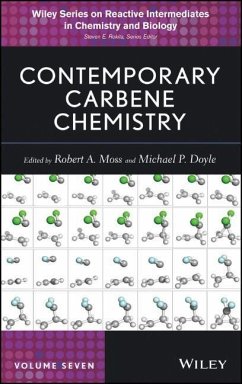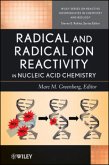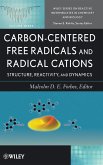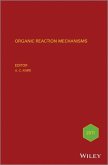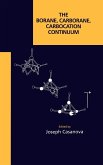The newfound stability of carbenes has led to their development as catalysts and ligands for metal complexes of vast potential, including biomolecule labeling and surface modification of materials. Providing a fresh evaluation of the field, Contemporary Carbene Chemistry explores novel structural, catalytic, and organometallic aspects of carbene chemistry. Chapters focus on the most interesting, fruitful, and promising directions in their topical areas. This timely text provides graduate students with the most innovative and promising aspects of carbene research over the past decade.
Presents the most innovative results in carbene chemistry, setting the foundation for new discoveries and applications
The discovery of stable carbenes has reinvigorated carbene chemistry research, with investigators seeking to develop carbenes into new useful catalysts and ligands. Presenting the most innovative and promising areas of carbene research over the past decade, this book explores newly discovered structural, catalytic, and organometallic aspects of carbene chemistry, with an emphasis on new and emerging synthetic applications.
Contemporary Carbene Chemistry features contributions from an international team of pioneering carbene chemistry researchers. Collectively, these authors have highlighted the most interesting and promising areas of investigation in the field. The book is divided into two parts:
Part 1, Properties and Reactions of Carbenes, explores new findings on carbene stability, acid-base behavior, and catalysis. Carbenic structure and reactivity are examined in chapters dedicated to stable carbenes, carbodicarbenes, carbenes as guests in supramolecular hosts, tunneling in carbene and oxacarbene reactions, and ultrafast kinetics of carbenes and their excited state precursors. Theoretical concerns are addressed in chapters on computational methods and dynamics applied to carbene reactions.
Part 2, Metal Carbenes, is dedicated to the synthetic dimensions of carbenes, particularly the reactions and catalytic properties of metal carbenes. The authors discuss lithium, rhodium, ruthenium, chromium, molybdenum, tungsten, cobalt, and gold.
All the chapters conclude with a summary of the current situation, new challenges on the horizon, and promising new research directions. A list of key reviews and suggestions for further reading also accompanies every chapter.
Each volume of the Wiley Series on Reactive Intermediates in Chemistry and Biology focuses on a specific reactive intermediate, offering a broad range of perspectives from leading experts that sets the stage for new applications and further discoveries.
Hinweis: Dieser Artikel kann nur an eine deutsche Lieferadresse ausgeliefert werden.
Presents the most innovative results in carbene chemistry, setting the foundation for new discoveries and applications
The discovery of stable carbenes has reinvigorated carbene chemistry research, with investigators seeking to develop carbenes into new useful catalysts and ligands. Presenting the most innovative and promising areas of carbene research over the past decade, this book explores newly discovered structural, catalytic, and organometallic aspects of carbene chemistry, with an emphasis on new and emerging synthetic applications.
Contemporary Carbene Chemistry features contributions from an international team of pioneering carbene chemistry researchers. Collectively, these authors have highlighted the most interesting and promising areas of investigation in the field. The book is divided into two parts:
Part 1, Properties and Reactions of Carbenes, explores new findings on carbene stability, acid-base behavior, and catalysis. Carbenic structure and reactivity are examined in chapters dedicated to stable carbenes, carbodicarbenes, carbenes as guests in supramolecular hosts, tunneling in carbene and oxacarbene reactions, and ultrafast kinetics of carbenes and their excited state precursors. Theoretical concerns are addressed in chapters on computational methods and dynamics applied to carbene reactions.
Part 2, Metal Carbenes, is dedicated to the synthetic dimensions of carbenes, particularly the reactions and catalytic properties of metal carbenes. The authors discuss lithium, rhodium, ruthenium, chromium, molybdenum, tungsten, cobalt, and gold.
All the chapters conclude with a summary of the current situation, new challenges on the horizon, and promising new research directions. A list of key reviews and suggestions for further reading also accompanies every chapter.
Each volume of the Wiley Series on Reactive Intermediates in Chemistry and Biology focuses on a specific reactive intermediate, offering a broad range of perspectives from leading experts that sets the stage for new applications and further discoveries.
Hinweis: Dieser Artikel kann nur an eine deutsche Lieferadresse ausgeliefert werden.

